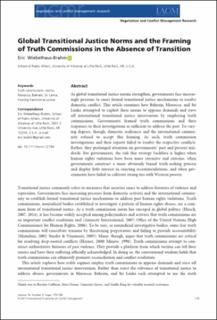Global Transitional Justice Norms and the Framing of Truth Commissions in the Absence of Transition
Journal article
Permanent lenke
https://hdl.handle.net/11250/2836979Utgivelsesdato
2020-01-01Metadata
Vis full innførselSamlinger
- Publications [1488]
Originalversjon
in Negotiation and Conflict Management Research vol. 14 no. 3 pp. 170-186 10.34891/rrhx-kc8710.34891/rrhx-kc87
Sammendrag
As global transitional justice norms strengthen, governments face increasingly pressure to enact formal transitional justice mechanisms to resolve domestic conflict. This article examines how Bahrain, Morocco, and Sri Lanka attempted to exploit these norms to appease demands and stave off international transitional justice intervention by employing truth commissions. Governments framed truth commissions and their responses to their investigations as sufficient to address the past. To varying degrees, though, domestic audiences and the international community refused to accept this framing. As such, truth commission investigations and their reports failed to resolve the respective conflicts. Rather, they prolonged attention on governments’ past and present misdeeds. For governments, the risk this strategy backfires is higher when human rights violations have been more extensive and extreme, when governments construct a more obviously biased truth‐seeking process and display little interest in enacting recommendations, and when governments have failed to cultivate strong ties with Western powers.
